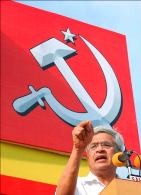 | « Back to article | Print this article |
 Claiming that their recent nationwide strike was a "big success", CPI(M) on Wednesday said it would intensify the struggle against rising prices and would not be deterred by the "politically motivated propaganda" about losses the hartal caused to the nation.
Claiming that their recent nationwide strike was a "big success", CPI(M) on Wednesday said it would intensify the struggle against rising prices and would not be deterred by the "politically motivated propaganda" about losses the hartal caused to the nation.
Left parties will coordinate with secular opposition parties to take up the petroleum products price hike in Parliament in the forthcoming monsoon session and consult on how to develop the movement outside, party General Secretary Prakash Karat said.
Noting that the success of the July 5 stir had led to the "usual" criticism of huge losses to the nation, he said "this cry is being raised by the very quarters who have received tax concessions worth thousands of crores in the last budget and who are being promised more in the Direct Taxes Code to be promulgated shortly".
"Taxes foregone through various exemptions to the corporate sector alone amounted to Rs 80,000 crore (Rs 800 billion) in 2009- 10," Karat said in an article in the forthcoming issue of CPI (M) organ 'People's Democracy'.
Lashing out at the Trinamool Congress, he said it "has been stripped off all its pretentious of defending people's interests by being part of the central government and going along with these anti-people measures".
While the Congress accused the Left of joining hands with BJP, the "corporate media is amusingly concerned about the ideological purity of the CPI(M)". He said four Left parties along with SP, AIADMK, TDP, BJD, JD(S), INLD and AGP gave the call for the hartal.
"Even the RJD and the LJP, which support the UPA government, have given a call for a bandh on July 10 in Bihar".
"Faced with such a big attack on the people's livelihood, no opposition party could keep away from an all-India protest. Other opposition parties, mainly the NDA, also gave a call for a bandh," Karat said.
Maintaining that the CPI(M) has opposed the petroleum pricing policies of successive governments, he said during the United Front government, when a deregulation policy was announced, the CPI(M) had strongly objected to it.
The CPI(M) had pointed out what steps should be taken to reduce the oil pool deficit. The UF government could not implement this policy as it did not last long after the notification, he said.
"However, deregulation was implemented by the NDA government in 2002 by dismantling the Administered Price Mechanism (APM). The CPI(M) opposed the policy and conducted agitations against the price hikes of petroleum products. The deregulation policy was discontinued in 2004," Karat said.
Now, the Manmohan Singh government's decision to deregulate petroleum prices would be met with "strong opposition from the CPI(M)", he added.